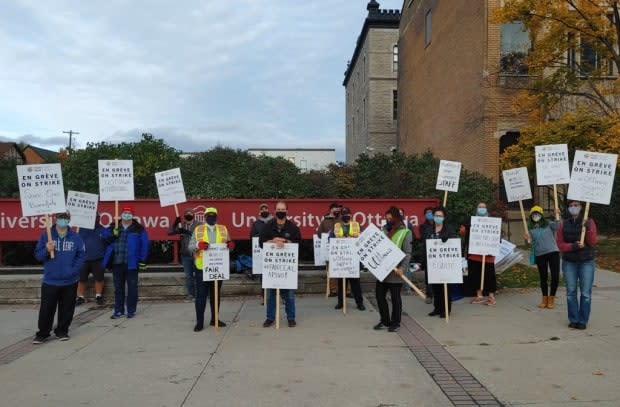Striking during the pandemic 'extremely challenging' say U of O support staff

About 1,300 support workers at the University of Ottawa who walked off the job Monday morning say they're worried the strike comes at a time when no one is paying attention to their story.
"It's extremely challenging," said Jonathan Degan, vice-president of the local bargaining unit of the Ontario Secondary School Teachers' Federation (OSSTF). It represents workers at the university ranging from mental health counsellors to lab technicians.
"Apparently we are the first union in Canada to be on a physical strike during the pandemic," said Degan. He said the effort required a lot of thinking about how to picket with safety protocols and physical distancing.
Workers who spoke to CBC News on the picket line Friday say other challenges are making them more anxious, including concerns they're being ignored by more than just the employer.
I don't want to be on strike. I want to be at work. - Elizabeth Campbell Brown
"Visibility is a big challenge for us," said Degan, a learning technologist who spent the last several months helping the school in the massive transition to switch to online learning.
Both sides have been bargaining for the last 19 months, with a major disagreement over health benefits. The union has been trying to preserve those health benefits including full coverage of prescription drugs.
Four-fifths of the membership rejected a tentative offer put forward in June, said Degan. Negotiations broke down, and a deadline came and went midnight Sunday.
University of Ottawa spokesperson Patrick Charette wrote in a statement that the employer "has listened to [support staff] and has made significant improvements to its proposal."
"We believe a negotiated agreement can be reached," Charette said. "We are available to discuss with the union to reach such agreement."
But the union says efforts to get the employer back to the negotiating table have been in vain.
With classes online, it became apparent that pressuring the employer the usual way — picketing entrances and disrupting the normal flow of campus life — was not going to have the same impact.
"It's been a struggle. We're all very stressed about the pandemic," said Jany Cormier, who normally works at the Student Affairs Office.

"It was pouring rain. It was cold," Cormier said about Wednesday's particularly awful weather. "We were drenched through when we came back home."
Union president Harvey Bischof came from the Toronto region that day for an organized media availability, and no media showed up, she said.
WATCH | Staff say pandemic has had a detrimental effect on the strike:
At the same time the University of Ottawa was in the middle of a national media storm over a teacher's use of the N-Word.
"We are definitely in the shadow of that story," said Cormier.
Strike pay drops after 10 days
The union offers strike pay that is equivalent to the amount people got for the Canada emergency response benefit, explained Degan, but that amount drops by half in 10 days.
"It's devastating," said Elizabeth Campbell Brown. She said she's really disappointed her employer is attacking health benefits in the middle of a pandemic.
"I don't want to be on strike. I want to be at work."


